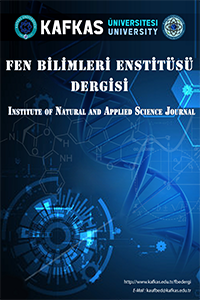Baharat Olarak Kullanılan Bazı Bitki Ekstraktlarının Memeliler Üzerindeki Genotoksik-Antigenotoksik Etkileri
İnsanlar tarafından kullanılan bitkilerin mutajenik, genotoksik ve kanserojenik özelliklere sahip olabileceği ve çeşitli yan etkileri olabileceği bilinmektedir. Bu derlemede, yaygın şekilde baharat olarak kullanılan bazı bitki ekstraktlarının memeliler üzerindeki muhtemel genotoksik-antigenotoksik etkilerine ilişkin çalışmaların gözden geçirilerek düzenlenmesi ve sonuçların mevcut literatüre katkı sağlanması amacıyla özetlenmesi amaçlanmaktadır. Mevcut doğal bilgiler, Kafkas Üniversitesi, Fen-Edebiyat Fakültesi, Biyoloji Bölümü Laboratuvarlarında yapılan araştırmalar doğrultusunda gözden geçirilerek yeniden düzenlendi. Birçok çalışmada, bitki özlerinin kısa süreli genotoksisite testleri ile gösterilen bazı genotoksik ve antigenotoksik etkilere sahip olduğu gösterilmiştir. Çeşitli test sistemleri kullanılarak yapılan çalışmalarla, bitki özlerinin hem gen hem de kromozomal seviyelerde etkili olduğunu tespit edilmiştir. Bu derleme için derlenen araştırmalara göre, baharat olarak kullanılan çeşitli bitkilerden elde edilen eterik yağların ve ekstraktların memelilerde hem genotoksik hem de antigenotoksik etkilere sahip olduğu bildirildi. Bu derlemede, bir takım bitki ekstraktlarının çeşitli toksik etkileri doz, süre ve uygulama yöntemine göre belirlenmiştir. Değerlendirilen çalışmalar temelinde farklı çalışmalarda elde edilen bulgular genel olarak birbiri ile örtüşmektedir.
Genotoxic-Antigenotoxic Effects of Some Plant Extracts Used as Spices on Mammalia
It is known that plants used by humans might have mutagenic, genotoxic and carcinogenic properties and have various side effects. In this review report, it is aimed to organize the studies on some plant extracts, which are commonly used as spices, on possible genotoxic-antigenotoxic effects on the mammals and the results are summarized to provide a further source for the literature. The available literatural information were arranged as review by revising in the direction of the researches in Kafkas University, Faculty of Arts and Sciences, Department of Biology Laboratories. In various studies, it has been shown that plant extracts might have some genotoxic and antigenotoxic effects which was shown by short-term genotoxicity tests. Studies which have performed using various test systems determined that plant extracts have showed their effects on both gene and chromosomal levels. According to studies compiled for this review, it has been reported that both essential oils obtained from various plants used as spices, and extracts have both genotoxic and antigenotoxic effects on mammals. In this review, various toxic effects of a number of plant extracts were determined according to dose, duration and administration method. Findings recorded in different studies on the basis of the assessed studies generally overlap each other.
___
- Liang Y.-Z., Chen H.-M., Su Z.-Q., Hou S.-Z., Chen, X.-Y., Zheng Y.-F., Li Y.-C., Lin J., Zhan J.Y.-X., Su Z.-R.,Fu L.-D. (2014). White Pepper and Piperine Have Different Effects on Pharmacokinetics of Puerarin in Rats. Evid Based Complement Alternat Med., 2014, pp. 8. doi: 10.1155/2014/796890
- Matic S., Stanic S., Bogojevic D., Solujic S., Grdovic N., Vidakovic M., Mihailovic M, (2011). Genotoxic potential of Cotinus coggygria Scop. (Anacardiaceae) stem extract in vivo. Genet. Mol. Biol. 34, 298–303.
- Mortelmans K., Zeiger E. (2000). The Ames Salmonella/microsome mutagenicity assay. Mutat Res, 455, 29-60.
